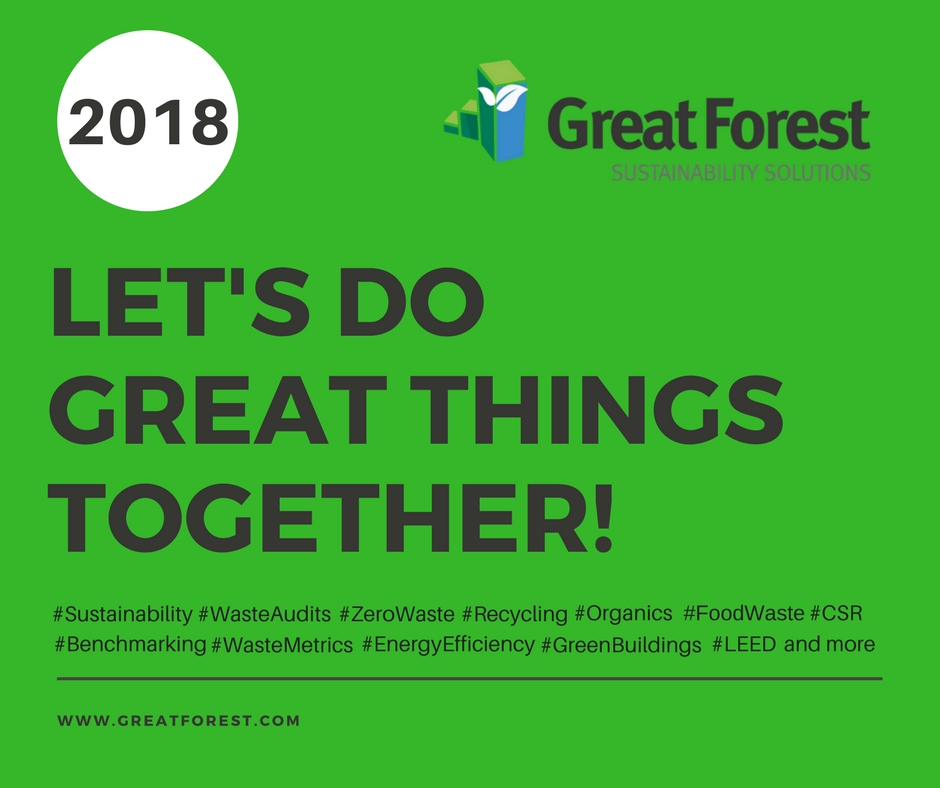
As we begin 2018, let’s look back on some highlights that made the news last year to see how it will affect your business this year. Let’s continue doing great things together!
1) TRUE Zero Waste
In September 2017, the GBCI launched the TRUE (Total Resource Use and Efficiency) Zero Waste certification, designed to help businesses and buildings achieve their zero waste goals through a program that now complements the USGBC’s LEED green building certification.
What this means for you:
With this updated rating system, you can now integrate your zero waste and LEED efforts for greater efficiency, if desired. On its own, it is a valuable tool.With waste costs rising every year, zero waste is becoming increasingly crucial and a key part of any waste management program. Here’s how to move towards zero waste in 3 steps. Start with this, and you’ll be ready to take on TRUE in no time.
2) Recommendations of the Task Force on Climate-Related Financial Disclosures
In June 2017, the Task Force on Climate-Related Financial Disclosures released its recommendations on reporting climate-related risks and opportunities in public financial filings.
What this means for you:
While the recommendations are voluntary, the trend is towards widespread adoption as investors begin to demand more information about companies’ exposure to climate risks, and how they are managing those risks. The future and growth of your business may depend on how you report and respond to the challenges. Sustainability reporting in all its forms will become more important. Click here to read the recommendations and the reports. Need help? Great Forest can review your current programs and set up a plan to help you prepare for climate-related financial disclosures.
3) Changes Across the Country
2017 brought some interesting changes, especially in NYC and San Francisco.
NYC’s improved recycling regulations: Our office has been busy this year working to get NYC properties and businesses in compliance with the new organics law, which came into force in January 2017, and the updated commercial waste and recycling laws, which began enforcement in August.
Compliance has its advantages (beside avoiding fines). As the President of the REBNY noted: The updated recycling rules simplifies the process and makes it easier for businesses to comply by imposing “the same regulations across all businesses, streamlining recycling and leaving behind a system where each business type follows a distinct set of guidelines.”
If you’re in NYC and still need help on this, read this Q&A on what NYC businesses should do, or call us.
San Francisco rate increases brings opportunity : In July, San Francisco approved rate increases for Recology, which handles waste collection and processing for the entire city and county. While the new rates are 14.42% higher, we have found that San Francisco companies can in fact reduce their waste costs by doing a little legwork.
The opportunity lies in calculating the optimum way to work within the new price structure. We have already locked in savings of $1000 a month for one hotel, with savings for more coming down the pipeline.
If you’re in San Francisco, prepare to do some research to see if your rates can be brought down. Call us for details.
What this means for you:
No matter where your properties and businesses are located, make it a habit to stay on top of changing rules in your area to avoid fines, which can add up. See our compliance checklist for some useful tips. A little legwork goes a long way.
4) Technology Drives Waste Industry Out Of The Stone Age
Technology is transforming waste management, from new machines that address organics, to powerful metrics dashboards and systems. This year, we continued to make waste management smarter, incorporating Enevo’s high tech system into our programs to enhance our waste and recycling solutions. The result? Our case study recorded our success at over 300 JBG locations in the DC region.
Enevo’s wireless sensors puts eyes on every container, capturing and generating data in real time for powerful waste analytics. Better monitoring and tracking of waste has led to improved daily waste management operations, faster verifications of pickups, increased hauler accountability, and more accurate billing, among a host of other benefits. Another big advantage? Enevo technology does not tie you down to any hauler or system.
What this means for you:
While technology is getting more powerful, it cannot replace good relationships or human experience. So look for a combination that works best for you.
5) U.S. Withdrawal from Climate Agreement — Companies Take The Lead
In November, Syria joined the Paris climate accord, leaving the U.S. as the only country opposed to the global pact to slash carbon emissions. In response to this and the current political climate, many companies are stepping up to fill the gap and the leadership void. This points to corporate sustainability concerns moving higher up the priority list as CEOs and other leaders position themselves and their companies for the future. We believe this will continue to reverberate and decisions made will affect every level of business.
Great Forest joined the global #beatpollution movement, with Great Forest President Richard Fuller reaching over 2 billion people worldwide through his nonprofit work. Around the world, corporate leaders are moving sustainability and environmental concerns up the priority list. Their decisions will reverberate.
What this means for you:
Look to the top and follow the lead of environmentally-minded business leaders. This is a great opportunity to push your sustainability goals and to gain attention for your efforts to shine. Remember to showcase your accomplishments, and take the lead when you can at every level.
